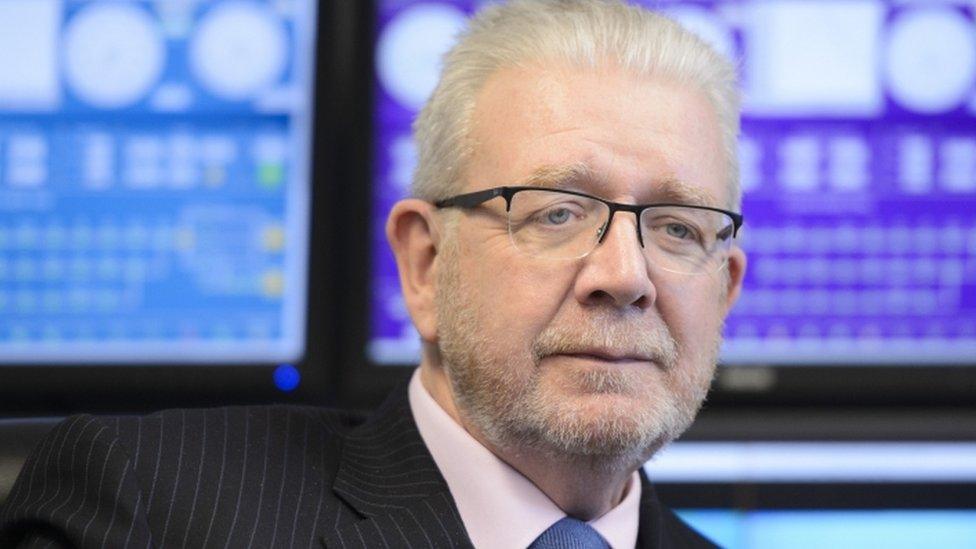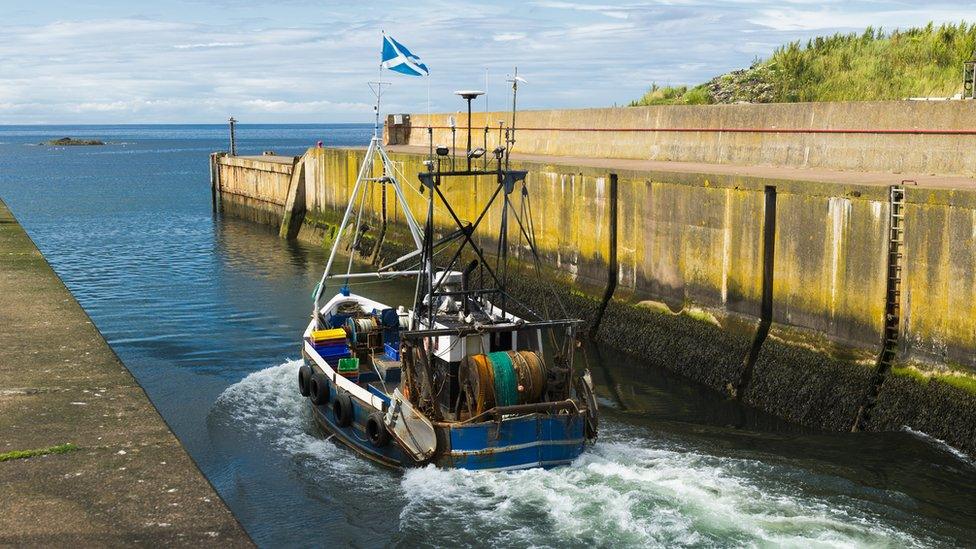No agreement after latest Brexit talks
- Published
- comments

The Scottish government was represented at the talks by Brexit Secretary Michael Russell
Talks between the UK and Scottish governments over Brexit have again broken up without agreement.
The talks were centred on whether powers should go to Westminster or Holyrood from Brussels immediately after the UK leaves the EU.
Both sides agree that progress has been made in recent weeks, but no deal has yet been agreed.
UK government sources had said ahead of the meeting in London that they hoped a breakthrough was close.
Further talks are expected to be held soon.
The Scottish government has repeatedly insisted that the EU Withdrawal Bill is a "power grab" as it will see Westminster, rather than Holyrood, take control of 111 EU powers in devolved areas such as agriculture and fishing immediately after Brexit.
The UK government confirmed on Thursday it had sent new proposals to Scottish government officials that would mean the "vast majority of powers will automatically flow from the EU to the devolved administrations".
Speaking after the meeting, Scotland's Brexit minister Michael Russell told BBC Scotland it was "likely" that there would need to be direct talks between Theresa May and Nicola Sturgeon over the issue at some point.
But he said: "I don't think we are at that stage quite yet because I think there has to be something to discuss, and there is no such agreement."
Mr Russell added: "The absolutely fundamental point is that the devolution settlement and the powers of the Scottish Parliament cannot be changed unilaterally by the UK government.
"What happens to devolved powers must be a matter for Holyrood and the UK government must recognise that.
"Progress is being made and we will continue to talk. I will continue to fight for the best deal for Scotland."
Sticking point
The major sticking point is that the UK government wants to retain "supervision" over some rules and regulations until UK-wide common frameworks are put in place.
It believes this is needed to prevent the UK's internal market being disrupted by different parts of the country introducing separate rules and standards for things like fishing, farming, food labelling and environmental protection.
The Scottish government says it is not opposed to UK-wide frameworks - but that, as they stand, the proposals would effectively give Westminster a veto over some of the Scottish Parliament's new powers.
It says that it should be for the Scottish Parliament, rather than the UK government, to decide which of its areas of responsibility are dealt with at a UK level.
Speaking at First Minister's Questions, Nicola Sturgeon said the proposals would "effectively give the UK government powers of imposition, or powers of veto" in matters that were devolved to Holyrood.
And she said "no Scottish government worth its salt" would accept anything that did not fully protect the devolution settlement.

What is the UK government proposing?
Analysis by Brian Taylor, BBC Scotland political editor

The UK government wants to avoid the possibility of Scottish fishing boats following different rules than those elsewhere in the UK
As I disclosed some weeks ago - when the issue was last discussed by ministers - the proposal in the EU Withdrawal Bill has been flipped.
The devolved powers will be returned to Scotland, Wales and NI. But with a caveat.
You will not be surprised to learn that it is the caveat which is causing contention. Indeed, the two sides tend to describe it in different terms, exemplifying their different standpoints.
Talk to sources in the Scottish government - and they describe the caveat as a "veto". Talk to sources in the UK government and they talk of a "backstop".
So what is intended? The idea is that the powers would be returned to the devolved administrations - but the UK government would retain supervision over certain of those powers in the first instance.
In essence, to avoid initial disparity, UK ministers would insist upon the adherence to EU rules - essentially replicating the EU framework, at first.
This would not apply to all the powers or anything like the totality. But it would be key powers such as agriculture, fisheries, food labelling and others.

UK Brexit Secretary David Davis met senior figures from the devolved administrations - including Mr Russell - in London to discuss the proposals.
The meeting was chaired by Cabinet Office Minister David Lidington, who said: "As we have always been clear, it is our intention that the devolved administrations will have more powers as a result of this process.
"It is also very important that we protect the UK internal market and ensure that companies all across the UK are able to buy and sell freely."
His comments were echoed by Scottish Secretary David Mundell, who said the talks were "making progress" but that "we are not there yet".
'Complex negotiations'
Mr Mundell added: "These are complex negotiations but I think the UK government has demonstrated, by bringing forward the draft of an amendment, that we are demonstrating flexibility and we are addressing concerns that both the Scottish government and the Scottish Parliament have raised."
The two sides have until March to reach an agreement before the Brexit bill passes through the House of Lords and becomes law.
Passing the bill without the backing of the Scottish Parliament could be politically problematic for the prime minister, who would be accused of ignoring Scottish opinion.
The Scottish government is expected to introduce its own EU Continuity Bill at Holyrood next week, but has indicated that the bill would only be needed if no agreement can be reached with the UK government.